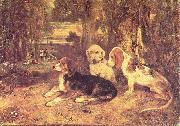La Peinture à l'huile en gros de Chine & Encadre |
|||||||||||

|
|||||||||||
|
|
|
||||||||||||||
|
Alexandre-Gabriel Decamps
(March 3, 1803 - August 22, 1860) was a French painter. He was born in Paris. In his youth he travelled in the East, and reproduced Oriental life and scenery with a bold fidelity to nature that puzzled conventional critics. His powers, however, soon came to be recognized, and he was ranked along with Delacroix and Vernet as one of the leaders of the French school. At the Paris Exhibition of 1855 he received the grand or council medal. Most of his life was passed in the neighborhood of Paris. He was fond of animals, especially dogs, and indulged in all kinds of field sports. He died in 1860 in consequence of being thrown from a horse while hunting at Fontainebleau. Decamps' style was characteristically and intensely French. It was marked by vivid dramatic conception, bold and even rough brushstrokes, and startling contrasts of color and of light and shade. His subjects embraced an unusually wide range. He availed himself of his travels in the East in dealing with scenes from Scripture history, which he was probably the first of European painters to represent with their true and natural local background. Of this class were his Joseph sold by his Brethren, Moses taken from the Nile, and his scenes from the life of Samson, nine vigorous sketches in charcoal and white. Perhaps the most impressive of his historical pictures is Defeat of the Cimbri, representing the conflict between a horde of barbarians and a disciplined army. Decamps produced a number of genre pictures, chiefly scenes from French and Algerian domestic life, the most marked feature of which is humour. The same characteristic attaches to many of his numerous animal paintings; Decamps was especially fond of painting monkeys. His well-known painting The Monkey Connoisseurs satirizes the jury of the French Academy of Painting, which had rejected several of his earlier works on account of their divergence from any known standard. |
||||||||||||||
|
|
||||||||||||||
|
||||||||||||||
|
|
||||||||||||||
| Alexandre-Gabriel Decamps
(March 3, 1803 - August 22, 1860) was a French painter. He was born in Paris. In his youth he travelled in the East, and reproduced Oriental life and scenery with a bold fidelity to nature that puzzled conventional critics. His powers, however, soon came to be recognized, and he was ranked along with Delacroix and Vernet as one of the leaders of the French school. At the Paris Exhibition of 1855 he received the grand or council medal. Most of his life was passed in the neighborhood of Paris. He was fond of animals, especially dogs, and indulged in all kinds of field sports. He died in 1860 in consequence of being thrown from a horse while hunting at Fontainebleau. Decamps' style was characteristically and intensely French. It was marked by vivid dramatic conception, bold and even rough brushstrokes, and startling contrasts of color and of light and shade. His subjects embraced an unusually wide range. He availed himself of his travels in the East in dealing with scenes from Scripture history, which he was probably the first of European painters to represent with their true and natural local background. Of this class were his Joseph sold by his Brethren, Moses taken from the Nile, and his scenes from the life of Samson, nine vigorous sketches in charcoal and white. Perhaps the most impressive of his historical pictures is Defeat of the Cimbri, representing the conflict between a horde of barbarians and a disciplined army. Decamps produced a number of genre pictures, chiefly scenes from French and Algerian domestic life, the most marked feature of which is humour. The same characteristic attaches to many of his numerous animal paintings; Decamps was especially fond of painting monkeys. His well-known painting The Monkey Connoisseurs satirizes the jury of the French Academy of Painting, which had rejected several of his earlier works on account of their divergence from any known standard. Jagdhunde 1839 Oil on canvas 26 X 37,5 cm 1839 Oil on canvas 26 X 37,5 cm |
||||||||||||||
|
Related Paintings to Alexandre-Gabriel Decamps :. |
||||||||||||||
|
|
||||||||||||||
|
|
||||||||||||||
|
CONTACTER DES Etats-Unis |







